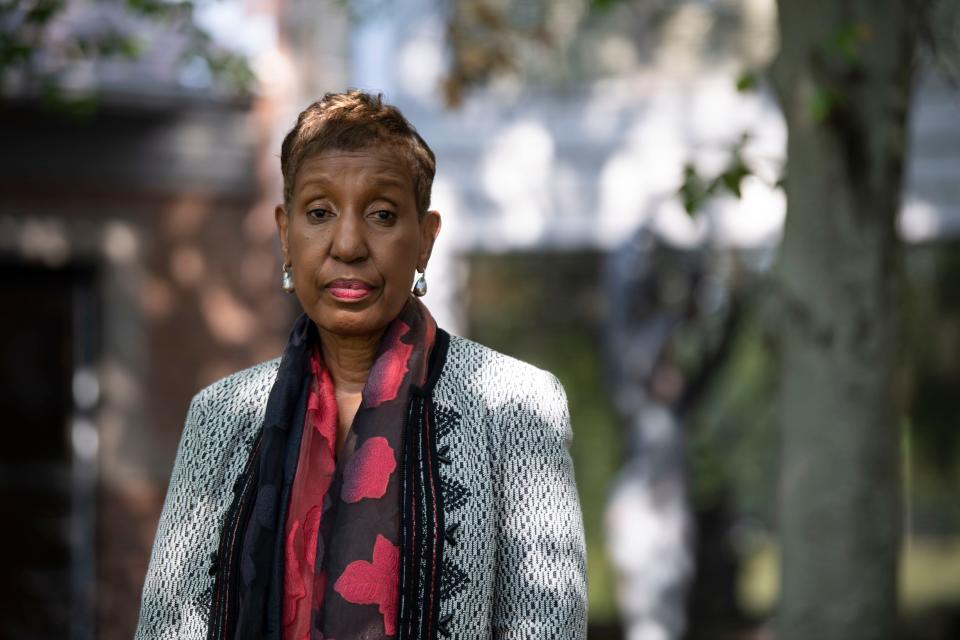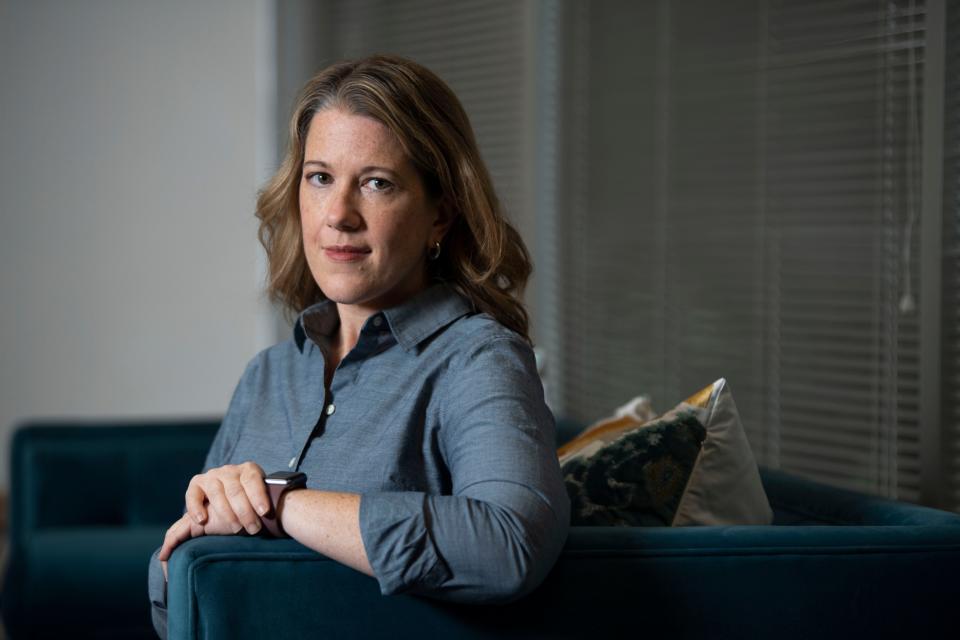'A license to abuse': How COVID created, amplified domestic violence across US, Tennessee
Editor's note: This story is part of a series on domestic violence. Other stories in this series focus on the scope of the problem in Tennessee, the judicial system and legal process, issues related to child abuse and the psychology of abusers. If you or someone you know needs help, call the National Domestic Violence Hotline at 1-800-799-7233.
Marie and Shaun Varsos' marriage had begun to fall apart long before the Lebanon gun fight between them in April 2021 ended in death, family members say.
Debbie Sisco, 60, was shot multiple times and fatally wounded at her StoneBridge subdivision home, according to police reports. Her daughter, Marie Varsos, 31, returned fire in a bid to protect herself, critically wounding her estranged husband with shots to the hand, abdomen and chest, reports said.
Though he survived the shootout, Shaun Varsos, 36, would later commit suicide near his Bellevue home. His actions that day continue to haunt Alex Youn, who was about 2,300 miles away in San Francisco when he learned via press conference that his mother and sister had been killed.
“My sister had all the cards stacked in her favor,” Youn said. He believes his sister's death shows how domestic violence can happen to anyone. “She was educated. She had a family that cared about her. She had a place where she could stay. She went through the right protocols. But there’s not one thing that went right in my sister’s case.”
Family members say the Varsos' eight-year marriage began to crack during the COVID-19 pandemic. They officially called it quits in 2020, but they decided to share custody of their dogs, a move that kept Marie, a pharmacist, in board-game maker Shaun's life, her brother said.
'License to abuse'
The American Journal of Emergency Medicine said domestic violence cases increased between 25-33% globally during the COVID-19 pandemic. Locally, YWCA CEO Sharon Roberson said violent cases skyrocketed.
"COVID gave abusers a license to abuse," she said.
The YWCA runs the Weaver Center, a domestic violence shelter in Nashville for women seeking refuge. Male victims are housed in hotels.
“People were in their homes, not going to work,” Roberson said. "Children were at home, and also there were a lot of financial pressures on people. And it was a toxic mix that resulted in very extreme cases of domestic violence or intimate partner violence"

The escalating violence in domestic cases is a growing concern for Roberson and others like her who are trying to help. Tennessee has consistently rated among the worst states for cases of men murdering women, ranking fifth in 2019, according to the most recent statistics.
At the height of the pandemic, Marie Varsos never reported any physical violence, but it was clear her relationship was crumbling, her brother said. He noted that it wasn't clear if the pandemic forced the couple to grow apart or if things took a violent turn.
He has suspicions.
Before her death, Youn said Marie Varsos told him that her ex-husband had strangled her and held her at gunpoint on a day they'd met in Bellevue to exchange pets. He threatened to kill her, the dogs and her family if she told authorities, Youn said, adding that she was able to leave and drive to their mother's house in Lebanon.
The shootout happened one month later, on April 12, 2021. Police said Shaun Varsos broke into Sisco's house and chased the two women out the front door. The case is an example of how domestic violence can escalate to murder, a trend that's growing in Tennessee.
“Since COVID, people have gotten crueler, meaner, and there are guns everywhere,” General Sessions Court Judge Ana Escobar said. She hears domestic violence cases every day.
In Nashville, case numbers rise and fall every year, but murder rates amid domestic violence disputes are higher than ever, according to 2022 data, which revealed that 15 domestic abuse cases ended in murder, up from six in 2021. So far this year, there have been 10 domestic violence-related deaths in Nashville through Oct. 7, according to police.
Aggravated assault cases related to domestic violence have also seen a jump, with 1,717 reported in 2022 compared to 1,588 in 2021.
But, overall, the state has seen fewer cases after the pandemic. In 2022, Tennessee saw 61,839 reports of domestic violence, down from 69,665 in 2020 and 71,042 in 2019, according to data from the Tennessee Bureau of Investigation.
COVID-19 creates shadow pandemic of domestic violence
United Nations Women reports say one in three women is a victim of domestic or sexual abuse. In many cases, the two intersect.
Tennessee Coalition to End Domestic Violence and Sexual Assault CEO Jennifer Escue said she rarely hears a story about domestic violence that does not include a sexual abuse component.

The COVID-19 pandemic created a subversive pandemic with increasing domestic violence cases nationwide, she said.
The Weaver Center's 65 rooms were put to the capacity test during COVID-19, with families large and small seeking aid, Roberson said. Not all rooms are one-size-fits-all, as some guests come alone while others bring children.
There are supersized rooms to accommodate almost any size family, Roberson said, and they were a great benefit during COVID-19. But even with more rooms and capacity than many other shelters in Tennessee, the YWCA still had to turn women away during the pandemic, Roberson said.
Before COVID-19, an average shelter stay was between 45-60 days, but during the pandemic, shelters were allowed to house people for 90 days, though Robertson wished she could have housed victims for six months, she said.
“It was so difficult to get people housing. People couldn’t get jobs,” Roberson said.
When a person or family comes into the shelter, they are given a few days to acclimate, and Roberson said programming is available to help them get back on their feet.
Pandemic fallout
For some victims, finding shelter was a challenge, as the pandemic forced social distancing, layoffs and more contact with accused abusers.
“They didn’t get a break,” Escue said. “Their abuser was always with them. No one was going to work. No one was leaving the house, so they were together, and they were being watched. And then you add the stress that those of us felt, being in close contact with our families or our roommates … it just escalated."
Escue said the lack of bed space continues to be a concern in Tennessee. Roberson agrees. She also said running shelters on tighter budgets presents another challenge, something that was made worse during the pandemic.
“Everything just feels like more. It’s just all the same problems, but the intensity is more,” Escue said.
Roberson said it takes about $3 million per year to fund the YWCA's efforts. The pandemic tightened the purse strings of many of the shelter's donors, and state and federal government funding that helps support agencies like YWCA was hard to come by, Roberson said.
Then there's the backlog of survivors waiting on justice, Escue said, as courtrooms, trials and hearings were delayed or stopped altogether in Tennessee during the pandemic.
Everyone was stretched thin, including case workers who were deemed essential.
“People get burned out, they just get trained, they’re making lower than typical wages. We’ve worked hard to really make our salaries a little more competitive to stabilize the workforce,” Roberson said. “However, it’s still an issue getting staffing in certain timeframes, because it’s a 24-hour operation.
"I’ve visited six programs in the past two weeks, and I heard from half of them that they were fully staffed for the first time in a few years."
Innovations due to COVID-19 pandemic
As mental health waned, inflation put a stranglehold on household budgets and many struggled to find any good out of the pandemic, there was a glimmer of hope as innovations in technology made it easier for victims to find help, Escue said.
A text option was created to help victims make a silent complaint, she said.
During COVID-19, Judge Escobar said Batterers Intervention, a program used to hold alleged abusers accountable, was not used.
"So things just went to hell in a handbasket. I mean, drug tests weren't being done, kids weren't going to school," Escobar said. She's hoping for additional programing for people experiencing grief and PTSD issues as they navigate lost jobs and trauma.
Therapy options were introduced for children and adults a few years ago, public assistance is offered to work toward separation or divorce and everyone is assigned a case manager to work through options and next steps, Roberson said.
Childhood domestic violence: 'Path of ... bad behavior': A look at child domestic violence cases in Tennessee
Reporters Kirsten Fiscus and Evan Mealins contributed to this story.
Reach reporter Craig Shoup by email at cshoup@gannett.com and on X @Craig_Shoup. To support his work, sign up for a digital subscription to www.tennessean.com.
This article originally appeared on Nashville Tennessean: Domestic violence in Tennessee: COVID isolated abusers, victims

